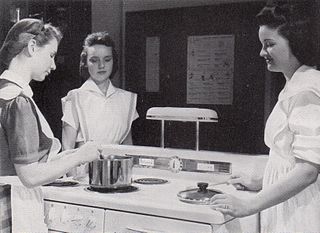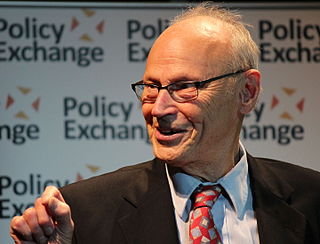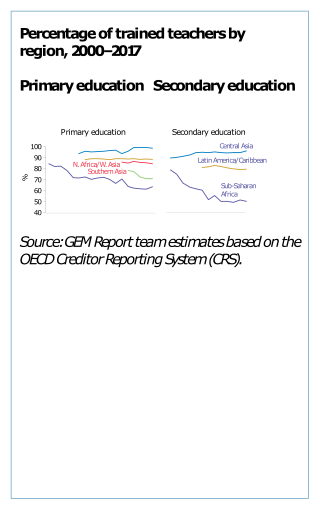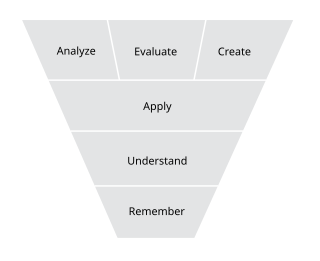
Phonics is a method for teaching people how to read and write an alphabetic language. It is done by demonstrating the relationship between the sounds of the spoken language (phonemes), and the letters or groups of letters (graphemes) or syllables of the written language. In English, this is also known as the alphabetic principle or the Alphabetic code.

Vocational education is education that prepares people to work as a technician or to take up employment in a skilled craft or trade as a tradesperson or artisan. Vocational Education can also be seen as that type of education given to an individual to prepare that individual to be gainfully employed or self employed with requisite skill. Vocational education is known by a variety of names, depending on the country concerned, including career and technical education, or acronyms such as TVET and TAFE.
A teaching method comprises the principles and methods used by teachers to enable student learning. These strategies are determined partly on subject matter to be taught and partly by the nature of the learner. For a particular teaching method to be appropriate and efficient it has take into account the learner, the nature of the subject matter, and the type of learning it is supposed to bring about.

Science education is the teaching and learning of science to school children, college students, or adults within the general public. The field of science education includes work in science content, science process, some social science, and some teaching pedagogy. The standards for science education provide expectations for the development of understanding for students through the entire course of their K-12 education and beyond. The traditional subjects included in the standards are physical, life, earth, space, and human sciences.

Teaching is the practice implemented by a teacher aimed at transmitting skills to a learner, a student, or any other audience in the context of an educational institution. Teaching is closely related to learning, the student's activity of appropriating this knowledge. Teaching is part of the broader concept of education.
Bloom's taxonomy is a set of three hierarchical models used for classification of educational learning objectives into levels of complexity and specificity. The three lists cover the learning objectives in cognitive, affective and psychomotor domains. The cognitive domain list has been the primary focus of most traditional education and is frequently used to structure curriculum learning objectives, assessments and activities.
Critical thinking is the analysis of available facts, evidence, observations, and arguments to form a judgment. The subject is complex; several different definitions exist, which generally include the rational, skeptical, and unbiased analysis or evaluation of factual evidence. Critical thinking is self-directed, self-disciplined, self-monitored, and self-corrective thinking. It presupposes assent to rigorous standards of excellence and mindful command of their use. It entails effective communication and problem-solving abilities as well as a commitment to overcome native egocentrism and sociocentrism.

Pedagogy, most commonly understood as the approach to teaching, is the theory and practice of learning, and how this process influences, and is influenced by, the social, political and psychological development of learners. Pedagogy, taken as an academic discipline, is the study of how knowledge and skills are imparted in an educational context, and it considers the interactions that take place during learning. Both the theory and practice of pedagogy vary greatly as they reflect different social, political, and cultural contexts.

Experiential learning (ExL) is the process of learning through experience, and is more narrowly defined as "learning through reflection on doing". Hands-on learning can be a form of experiential learning, but does not necessarily involve students reflecting on their product. Experiential learning is distinct from rote or didactic learning, in which the learner plays a comparatively passive role. It is related to, but not synonymous with, other forms of active learning such as action learning, adventure learning, free-choice learning, cooperative learning, service-learning, and situated learning.
A lie-to-children is a simplified explanation of technical or complex subjects as a teaching method for children and laypeople. The technique has been incorporated by academics within the fields of biology, evolution, bioinformatics and the social sciences. It is closely related to the philosophical concept known as Wittgenstein's ladder.

Eric "E. D." Donald Hirsch Jr. is an American educator, literary critic, and theorist of education. He is professor emeritus of education and humanities at the University of Virginia.

Teacher education or teacher training refers to programs, policies, procedures, and provision designed to equip (prospective) teachers with the knowledge, attitudes, behaviors, approaches, methodologies and skills they require to perform their tasks effectively in the classroom, school, and wider community. The professionals who engage in training the prospective teachers are called teacher educators.

Higher-order thinking, known as higher order thinking skills (HOTS), is a concept of education reform based on learning taxonomies. The idea is that some types of learning require more cognitive processing than others, but also have more generalized benefits. In Bloom's taxonomy, for example, skills involving analysis, evaluation and synthesis are thought to be of a higher order than the learning of facts and concepts which requires different learning and teaching methods. Higher-order thinking involves the learning of complex judgmental skills such as critical thinking and problem solving.
Sandra Stotsky is Professor emerita in the Department of Education Reform at the University of Arkansas, and held the 21st Century Chair in Teacher Quality. Her research ranges from teacher licensure tests, e.g., (1), coherence in the literature and reading curriculum, e.g., (2), and academic achievement in single-sex classrooms, e.g., (3) to critiques of Common Core’s standards in English language arts, e.g., (4) mathematics.(5), and US History and civic education (6), and other aspects of the Common Core project, e.g., (7), and to reviews of books in education, e.g., (8) She is an advocate of standards-based reform and strong academic standards and assessments for students and teachers.
Inquiry-based learning is a form of active learning that starts by posing questions, problems or scenarios. It contrasts with traditional education, which generally relies on the teacher presenting facts and their own knowledge about the subject. Inquiry-based learning is often assisted by a facilitator rather than a lecturer. Inquirers will identify and research issues and questions to develop knowledge or solutions. Inquiry-based learning includes problem-based learning, and is generally used in small scale investigations and projects, as well as research. The inquiry-based instruction is principally very closely related to the development and practice of thinking and problem solving skills.

Reading is the process of taking in the sense or meaning of letters, symbols, etc., especially by sight or touch.
Daniel T. Willingham is a psychologist at the University of Virginia, where he is a professor in the Department of Psychology. Willingham's research focuses on the application of findings from cognitive psychology and neuroscience to K–12 education.
Daisy Christodoulou is Director of Education at No More Marking, an online engine which aims to help teachers with comparative-judgement assessment of school work. Before this she was head of education research at the charity Ark, where she continues to be involved in an advisory capacity.
Alida Anderson is a professor at the School of Education at American University in Washington, DC.
Joe Kirby is a British school teacher and deputy head at Jane Austen College, who writes on translating research into the classroom. In 2013, he published How To Start on Teach First.









